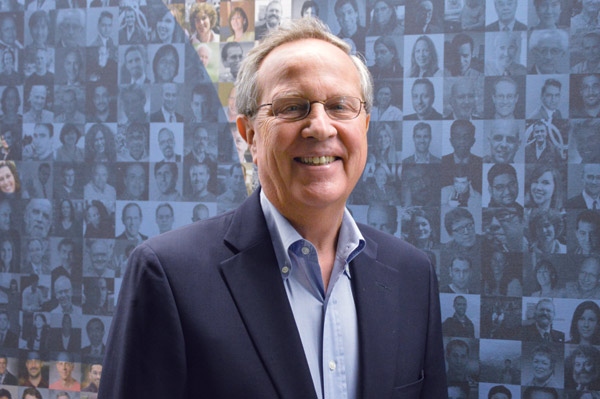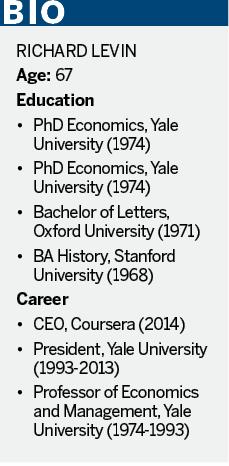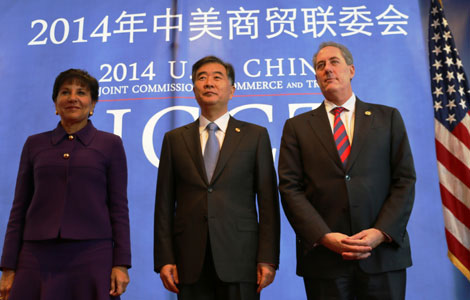Yale president-turned-Coursera CEO sees China soar
Updated: 2014-10-17 23:29
By Qidong Zhang(China Daily USA)
|
||||||||
 |
|
Richard Levin, former Yale University president and current CEO of online education site Coursera, is bullish on business with China. [Qidong Zhang/for China Daily] |
China has a friend in Richard Levin, the former president of Yale University who now heads up online education giant Coursera.
"China is our fastest growing market, and our team is building initiatives and travels there all the time," Levin said. "Many of the Chinese users are over college age and take the online courses either for personal fulfillment or to improve their job skills."
Coursera was founded two years ago by Stanford computer science professors Andrew Ng and Daphne Koller. It currently offers more than 800 free courses from 112 institutions globally, aiming to become the largest online educational platform in the world.
Levin had always worked on forging ties between the US and China in his 20 years as Yale president. He developed student exchange programs and supported academic research and leadership training with Chinese universities and the Chinese Ministry of Education.

It was no surprise to his colleagues at Yale when he chose to join Coursera as CEO in March 2014. Coursera, based in Mountain View, California, now has more than 10 million users, with China having the second-largest user base after the US.
Levin worked on Sino-US educational exchanges while at Yale with three former Chinese presidents: Xi Jinping, Hu Jintao and Jiang Zemin. Levin was known for his attempts at internationalizing Yale.
A San Francisco native, Levin learned of Chinese culture first hand.
"I attended public elementary and middle school in San Francisco where there were about 25 percent Chinese American students, so I grew up having many Chinese friends," he said.
He graduated from Stanford University in 1968 with a BA in history. He received a Bachelor of Letters in politics and philosophy from Merton College, Oxford. He earned his PhD in economics from Yale in 1974. His academic specialties include industrial research and development, intellectual property, and productivity in manufacturing.
"I witnessed the tremendous growth of China, and I wanted to build a relationship with China and make it our (Yale's) long-term strategy," said Levin.
Levin became an assistant professor of economics at Yale in 1974 and was elevated to associate professor in 1979. In 1982, he was promoted to professor of economics and management at the Yale School of Management. In 1992, he was appointed Frederick William Beinecke professor of economics. Before becoming president, he served as chairman of the Economics Department and dean of Yale's Graduate School of Arts and Sciences.
Levin became the Connecticut university's president in 1993 after teaching at the Yale School of Economics for 19 years. He also holds an honorary degree from Peking University and an honorary professorship from Fudan University.
Under his leadership, Yale's endowment grew from $3.2 billion to more than $20 billion. Its admission standards and academic prestige recovered from a lull in the early 1990s, since his appointment. Applications to Yale College rose from below 11,000 for the class entering in 1993 to 28,975 for the class entering in 2012. Yale also aggressively expanded its efforts to recruit international students.
Having traveled to China nearly 30 times, Levin said he made the country the focus of one of the university's major global initiatives.
"We sponsored an Advanced University Leadership Program for the presidents and vice presidents of China's 14 leading universities to study at Yale," he said. "We also sponsored an executive education program for the most senior cohort of Chinese governmental officials to study outside the country at Yale, and we established an active student exchange program with many Chinese universities," said Levin.
Describing his new role as CEO of Coursera as "very exciting", Levin believes his extensive connections in China will help build the company's presence there.
Approximately 80,000 users sign up each month for Coursera courses, and China has the most potential in the number of users, Levin said. Fudan, Jiaotong, Nanjing, Xi'an Jitong and Peking universities are business partners with Coursera in China.
"We aim to empower and enrich the educational platform in China by making our courses available online, which is most powerful in this most Internet-using country in the world," Levin said. "The purpose of our tool is to provide anyone with access to the Internet to have the ability to receive a self-paced higher education, so even in local institutions, students can be guided and enhanced in their learning."
A wide variety of courses are offered by educators worldwide in physics, engineering, humanities, medicine, biology, social sciences, mathematics, business, computer science and other subjects. The company also has an official mobile app for iOS and Android.
"The most popular courses among nearly 1 million Chinese users are data analysis, computer science, computer engineering, and most surprisingly, social psychology and a Chinese history course," he said. "Most of the courses are taught in Chinese, and in many other languages. We see a great increase in users when the native language is offered.
"We are constantly improving that platform to make it possible, for example, [to have] on-demand courses," he said. "We find our learners are mostly professionals who have jobs, and they demand their schedule, their time and their pace."
With 150 employees, Levin said Coursera is growing "very, very fast". Six months ago, it had 65 employees.
The current challenge is providing more original content from China and translating foreign content into Chinese. Levin said Coursera makes a major effort in its translation program.
Describing his career change from Ivy League president to Silicon Valley startup CEO, Levin said it's "a learning experience of adapting to new environment, working with a lot of talented people, and making decisions at a much faster pace".
He also said it was good to be back in the San Francisco Bay area. Levin and his wife, Jane, an English professor at Yale, have four children and seven grandchildren.
For China Daily
qidongzhangqidong@gmail.com
Most Viewed
Editor's Picks

|

|

|

|

|

|
Today's Top News
China OKs modified corn imports
California city fights 'birth tourism'
Build, not break, a bridge for people
Chinese city shops for talent in Houston
Cleaner coal goal in deal by Houston firm
China, US get things done at trade talks
China niche for California design firm
NYC schools can mark Lunar New Year
US Weekly

|

|
















